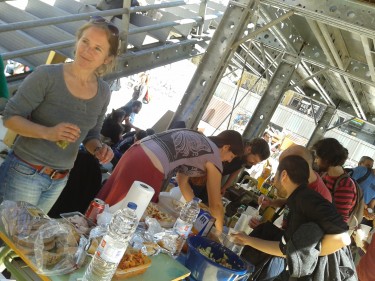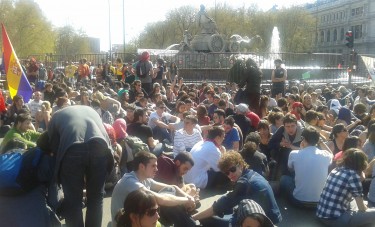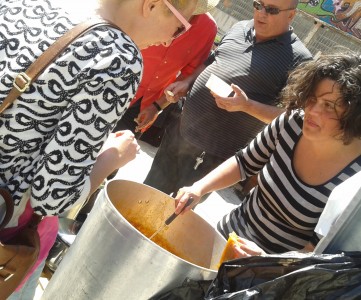This post is part of our special coverage Europe in Crisis.
“Act, take to the streets, do not consume [es].” With this slogan, the Assembly of the Neighborhood Los Austrias in Madrid convened the 29M General Strike (on March 29) in Spain, which had a massive attendance across the country. This direct call to action [es] is contrasted with the labor unions’ more impersonal slogans – “They want to change everything” – and is an example of the rift that opens in every social movement between the official conveners and those who demonstrate without a flag of any sort.
In this sense, the 15M movement has been a turning point in terms of supporting the calls of a part of civil society, organized in collectives, neighborhood assemblies, and local or individually-led associations. In this general strike, the citizen movement has taken different forms in the streets, neighborhoods, social organizations, and digital social networks.
One of the initiatives has been the “consumption strike.” Many took to the streets with their own food and drinks from home:

Popular Lunch in favor of the workers' strike in Campo de la Cebada de Madrid. Photo by author Lidia Ucher.
- 14h: Comida Popular – traerse el tupper para compartir (recuerda #HuelgadeCONSUMO, cocina el día anterior)
The intention was to support the strike and take to the streets without paying to consume food for 24 hours. This is how Kaos en la Red summarize the motives:
En principio, la idea es sencilla: una huelga de consumo consiste en dejar de consumir bienes y servicios durante el día fijado para la huelga. Realizar una huelga de consumo respondería a dos de las limitaciones de una huelga general: por una parte, incluye a toda aquella persona que no puede realizar huelga “laboral” – en realidad, se supone que sólo pueden realizarla trabajadores por cuenta ajena, y de estos ni tan siquiera todos-; por otra, dejar de consumir bienes pero sobre todo servicios contribuiría de alguna manera a no forzar a alguien a trabajar – y así, de paso, contribuir a deslegitimar la práctica de fijar servicios mínimos abusivos para minimizar la repercusión de la huelga.-
One of the suggestions to support the consumption strike was to “disconnect oneself,” to affect the statistics of home electric consumption at the moment the strike's impact was measured.
Another one of 29M's proposals from the neighborhood assemblies was the “care and gender strike” [es]:
…la propuesta es ponernos nuestro mejor delantal, guantes y utensilios varios con un cartel “Huelga de Cuidados” ¿Y dónde hacemos el piquete? Pues en los hogares. Vamos a contarle a las señoras que no lo sepan lo que es una huelga de cuidados y porqué es necesaria. Nos apoyaremos en el díptico que adjuntamos Díptico: Comando de cuidados para la huelga (Es importante imprimir a doble cara para cortar por la mitad, haced las copias que podáis!!!).
From the collectives and neighborhood assemblies, 29M has become a new important date for the movements’ agenda, in which hundreds of people have thrown themselves to organize, call, and mobilize thousands more. And it is not revolving around large productions nor labor union meetings, but rather simple ideas that can motivate many more people to take to the streets and take part in demonstrations, in another way, or perhaps the same way as always [es]:

29M in Madrid. Photo by author Lidia Uche

29M in Madrid. Photo by author Lidia Ucher.
On social networks, the following hashtags have been created to make innovations in alternative and creative slogans surrounding the strike [es]: #Take29M, #29M, #29BadStreet, #TaketheSTRIKE, #Iamstriking,#onstrike… and #SignsStrike
On their part, some social organizations have supported the general strike like State Coordinator of Spain-NGO's, the 2015andmore Platform, and the Spanish Alliance Against Poverty [es]:
…Y además el Gobierno asesta un duro golpe a nuestro modelo social, a los pilares del Estado de bienestar: la sanidad, la educación y las políticas sociales; eliminando o devaluando importantes derechos civiles como el derecho de las mujeres a la interrupción del embarazo, el matrimonio homosexual o los derechos de inmigración. De no evitar esta reducción de derechos, presentadas de forma falaz como reformas, asistiremos a una quiebra de nuestro modelo de convivencia, y a la confirmación de un programa de acción política sometido a la exigencia de los mercados financieros.
This post is part of our special coverage Europe in Crisis.






